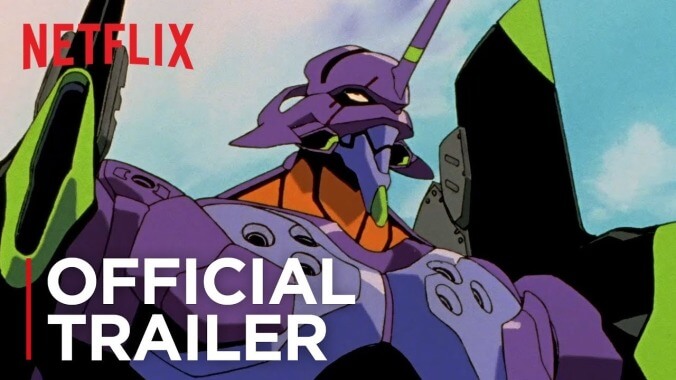The writer of Mandy is here to break down the enduring importance of Neon Genesis Evangelion

Here’s three words you may have seen on your social media timeline over the past few days: Neon Genesis Evangelion. You’ve likely seen them thrown about with a palpable giddiness, leading you to Google them and be met with this vague, deflating description: “Teens fight alien war machines. Animated.” A 1995 anime created by Hideaki Anno, its impending arrival on Netflix marks the first time the series will ever be available on a streaming platform. So, why should you care?
That’s…a complicated question, as the series’ story of giant monsters and the teenagers trying to destroy them is loaded to the gills with provocative religious imagery and oft-punishing meditations on depression, existential dread, and psychology. Thankfully, screenwriter Aaron Stewart-Ahn, who penned this year’s delightfully mind-fucking Mandy, is here to outline the anime’s influence and themes, as well as how Anno’s personal struggles with depression informed them. Better yet, he explains it in a way that illustrates just why it’s all so personal for those who’ve latched onto the series.
“Evangelion is seriously fucked up, in the best way,” he begins in a lengthy Twitter thread. “Landmark work of 20th century pop culture still being copied 20 years later. Forgive me but here’s a primer of how intrinsically it’s linked to depression & how it became legendary… By failure.”
Stewart-Ahn describes the show as “a mashup of the entire seabed of Japanese pop culture: sentai shows, kaiju movies, mecha, shoujo soap operatics, child pilots, disaster scenarios, & pop songs.” He goes on to note how, with its budget dwindling but Anno’s own sense of hope rising, the final two episodes abandoned “robot action & mythology” for “an abstract internal battle begging the audience to not succumb to loneliness & isolation.” While some fans embraced that ending, others were so furious as to send death threats. This led him to use the series’ subsequent sequel—End of Evangelion—to confront that response, resulting in what Stewart-Ahn says is “one of the most incredible critiques of fandom and all the nastiness we’re still caught up in 20 years later.”
We’ll let him take it from here:
There’s much more to the thread, which begins here. Give it a read and check out Netflix’s trailer for Neon Genesis Evangelion below. All 26 episodes, as well as the films The End of Evangelion and Evangelion: Death (True)2, will land on the streamer in spring of 2019.